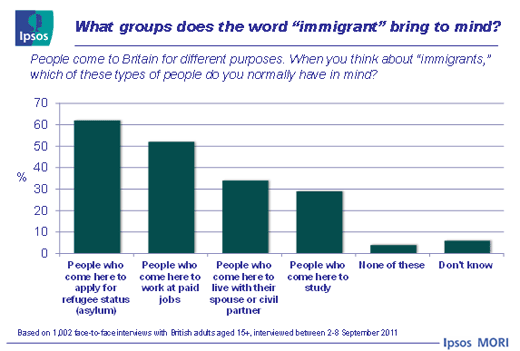Addressing public concerns on immigration requires looking beyond the numbers

When you hear the word ‘immigrant’ who do you think of? According to the recent Migration Observatory poll, conducted by Ipsos, a person’s reason for coming to the UK has a sizeable bearing upon whether or not the British public associates the word ‘immigrant’ with them.
Hence, just three in ten Britons classify people who come to Britain to study as ‘immigrants’ (29%), despite the fact that students represent the largest group of immigrants coming to the UK (37% of 2009 immigrant arrivals). Instead, most British people associate ‘immigrants’ with asylum seekers (62%) although asylum applications have made up a tiny fraction of immigration over the last five years (on average just 5%; see the Migration Observatory’s website for trends in migration from 1991-2009).
 In political terms, this has the potential to spell trouble for the coalition government’s immigration cutting agenda. The difficulty for David Cameron is being able to ensure the public are on the same page when he talks about reducing net immigration. The two groups the government is trying to curtail, students and spouses/partners, are not only lower on the list when people think about the word ‘immigrant’, they are also (perhaps consequently) not the groups the public would most like to see reduced.
In political terms, this has the potential to spell trouble for the coalition government’s immigration cutting agenda. The difficulty for David Cameron is being able to ensure the public are on the same page when he talks about reducing net immigration. The two groups the government is trying to curtail, students and spouses/partners, are not only lower on the list when people think about the word ‘immigrant’, they are also (perhaps consequently) not the groups the public would most like to see reduced.
Rather, the poll shows that the majority of British people would rather see a reduction in the number of asylum seekers (56%) and low-skilled workers (64%), as well as extended family members. However, restricting asylum would only make a negligible dent due to asylum representing such a small percentage of overall immigration, and the government has little control over low-skilled immigration, nearly all of which comes from the EU.
On the asylum issue in particular, many in the charitable sector have declared for years the need to challenge public perceptions about asylum seekers. If nothing else, the findings of this poll put into perspective just how wide the perception gap is on the asylum issue and may pose as a more general reminder to the government that to address concerns about immigration, it needs to do much more than simply cut numbers.



